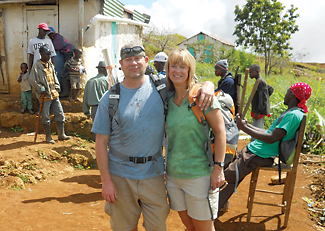Kim Smith went on a mission trip to Haiti 13 years ago to help build a school, church and medical clinic in a village called Seguin. As a registered nurse, she helped assess people from the surrounding area and provide much needed medial care.
About 250 ill villagers lined up each day seeking care, including a boy with a infected open fracture and a woman with a basketball-sized tumor. Smith felt overwhelmed knowing she could only do so much in a week long trip, so she returned to Seguin six months later and has been making regular trips to volunteer ever since.

Kim Smith, with husband Bob, on a recent volunteer trip to Haiti. Photo courtesy Kim Smith.
Smith is a staff nurse in the East Ann Arbor Health and Geriatric Center, an outpatient branch of the U-M Health System. She is responsible for patient triage, both over the phone and on site. She assesses incoming patients to establish their healthcare needs and works with a team of doctors to ensure they’re met.
Though Smith first went to Haiti on a church-sponsored mission trip, most of her volunteer work has been with a nonprofit organization called Raincatchers that she and a friend founded seven years ago.
Smith saw that women and children were traveling over a mile to find water. Her friend experimented with water collection systems at his home and when he found one that worked they began installing them on homes in Seguin.
“The expression on people’s faces when you are giving them the gift of water … has been priceless,” Smith says. “We did this for an elderly woman this last trip and she just started crying. She was incredibly amazed.”
Since Raincatchers was founded, Smith has made about four to five weeklong trips each year to help install the rain-catching systems, and this year she will make seven. The organization has brought local college students to volunteer, and Smith’s husband and sons have accompanied her to Seguin a few times as well.
Smith said one of the most rewarding experiences in her work at the geriatric center was with a pancreatic cancer patient. The woman had been with the center a year and a half, during which Smith made weekly calls and bi-weekly check ups so she was able to live life independently with outpatient care.
“She said ‘you don’t know how wonderful it’s been that you all have supported me enough that that I can stay in my home.’ She verbalized that, and it pretty much sealed the deal for me,” Smith says of the patient who recently died.
In addition to rewarding interactions with patients and their families, Smith says she feels blessed to have supportive coworkers. They understand when she takes time to volunteer in Haiti, and even organized a collection to raise money to help the people of Seguin.
Seeing the effects of Hurricane Tomas in November 2010 and the devastating earthquake earlier last year in Haiti haven’t changed the way Smith feels about her volunteer work, she says. But the national attention and additional problems the Haitian people face following these disasters has shown her an increased sense of urgency in getting help to those in need, she says.
“The awareness after the earthquake was good, but I think it has started to wear off because people are seeing that the government is corrupt and they’re not sure they want to send their money there,” Smith says. “I can understand that, but I also see a real need. I see the needs of the people, I see that kids are hungry and … aren’t getting the care that they need. It’s personal for me, and I understand that it’s not for others. But I’m glad that people are paying more attention.”
The weekly Spotlight features staff members at the university. To nominate a candidate, please contact the Record staff at [email protected].

